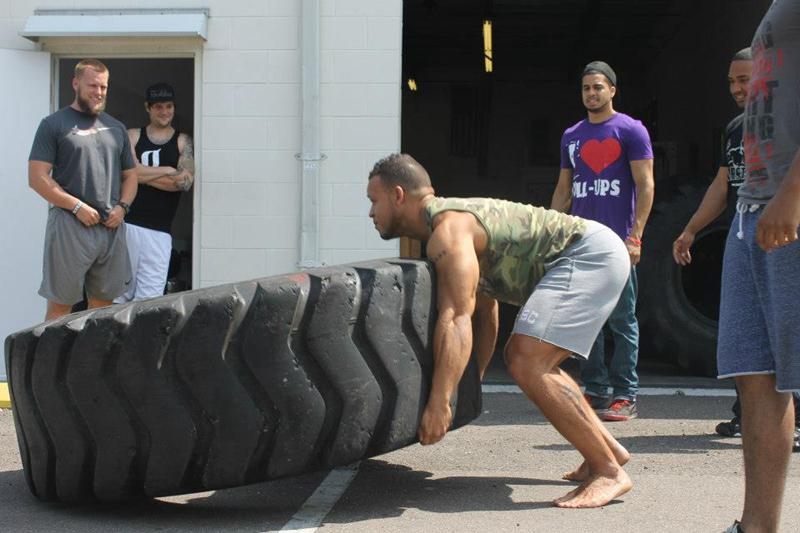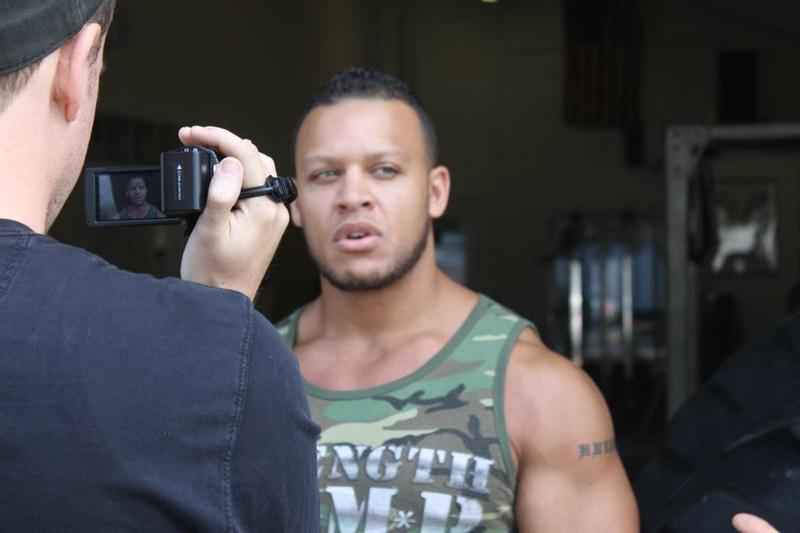Dragon Door: How did you get started with strength and performance?
Elliott Hulse: Way back when I was about four years old, my uncle—my mother's brother—came to live with us. Both of my parents and my uncle are from Belize, and had a naturally athletic upbringing. They basically ate from the land. My dad climbed trees to get coconuts, and his father was a farmer. My uncle also grew up in that environment, and was about 25 when he came to live with us. I'd watch him do standing back flips, all kinds of calisthenics, and chop bricks with his hands in my parents' basement. He was literally like superman. As I grew up, my friends would come over just to watch him do back flips!
He taught my younger brothers and I how to start working out. We'd do push ups, sit ups, chin ups, climb ropes, beat the heavy bag, do cartwheels, and all kinds of calisthenics starting at a young age. We became some of the best athletes in our elementary and middle schools growing up. By the time we got to high school, my uncle had decided to become a personal trainer, back when that profession was just starting out.
We bought a barbell set, and he taught us how to work out with barbells in the basement. We gained a lot of muscle and strength—and we got stronger and faster. So much stronger and faster, that I earned an athletic scholarship to a Division One Football program where I studied exercise science. So, today I earn a living teaching people how to get stronger.
Dragon Door: That's awesome, I had no idea that you were inspired as early as age four! When did you get started with Strongman training?
Elliott Hulse: After graduating from college and starting my own business, I wanted to make my place in the world of fitness. I decided to take up a new sport, with the intent to turn professional so I could really apply the knowledge gained from years of study and experience. So I started competing in the sport of Strongman. I turned professional and was on the road to becoming one of, if not the strongest professional Strongmen in my weight category. Everything was going really well. My business was just getting started, I had started a family, and I was literally about to become the strongest man in the country in my weight class. Then I tore my bicep.

This injury made me stop and take a real, honest look at my life. The way I was proceeding with regard to strength was totally imbalanced. Although my body was very big, very strong, and I was able to move lots of very heavy, odd objects in Strongman competitions, I wasn't paying close attention to my physiology. I wasn't being mindful of my energetic processes, my psychology and modes of thinking and behavior. So, obviously I couldn't be the strongest version of myself as I went out to serve people in the world. I could've had a better situation with my family and my business if had I taken a balanced approach to strength.
After the mistake of going overboard with heavy strength training and injuring my body, I developed what I now call the Four Layers of Strength. When you maximize all four layers, you can truly become the strongest version of yourself.
We're all familiar with the very first layer of strength, which is what happens when we lift kettlebells, barbells, dumbbells, do chin-ups etc. It's what I call neuromuscular strength, or training the nervous and muscular systems to perform. But it's really just an expression of the deeper layers of strength.
The layer right below it is our physiological strength which is based in eating right, sleeping right, taking care of our hormonal health, digestive system, etc. If we don't take care of our physiology, then nothing else will be fully maximized with regard to our performance. I've learned through study and experience that there are ways to maximize your potential physiologically.
Below physiological strength is a layer that really animates the other two. I call it energetic strength. It's psychological, and relates to how you choose to see and approach life—the way you think about situations and respond to stress. This absolutely effects the other two layers, physiological strength and neuromuscular strength.
Wilhelm Reich, a student of Freud, describes physical character structures that are manifestations of a given psychological profile. For example, if you're fearful, you can feel it in your muscles. Your neck and shoulders will tense and start to hike up. Breathing will become shallow. Now, imagine if someone habitually puts themselves in fearful situations, or is constantly scared, angry, sad, depressed, dependent, needy, or has low self-esteem? Over time, they will physically become that way. That's why we need to work with the body, mind, and energetic strength in the third layer.
Finally, I call the fourth layer presentable strength. If we're spending all this time and energy building up our bodies, cleansing our bodies from the inside, enhancing our physiology, our psychology, and our character structure, it's worth nothing if we're not using it to inspire and support other people. The fourth layer is about presenting yourself as a gift to the world and inspiring other people to become the strongest version of themselves.
Dragon Door: Even though all the layers seem interdependent, of the four, which one do you feel is absolutely crucial?
Elliott Hulse: You're right, they all blend together, and I call them layers because one without the others is useless. But if I had to be completely honest about the first place to work, it would be energetic strength because in many ways, everything is tied together by our nervous system. The central nervous system originates from what I call the "head brain" which literally extends itself into the body through the spinal cord, and the peripheral nervous system which innervates our organs and muscular systems.
Bad thoughts and un-resourceful behaviors—that are typically unconscious—are given to us. We are taught to sit down, shut up, follow directions, fall in line, and be a robot from the time we're children. That's not really a resourceful position for us to start our lives from, but it becomes unconscious and most people are walking around miserable because of it. They don't realize that they've been conditioned to be this way and are literally making themselves physically sick. Respiration is usually the first thing to become depressed, so most people don't breathe very well. Then this extends into neurotic holding patterns throughout the entire muscular system.

Dragon Door: You've been blogging and interacting with people online since 2006. How did you get started?
Elliott Hulse: I began my business by opening a warehouse gym, which was actually way over my budget, but I felt the inclination to start a business and wanted to help people to get stronger. I was doing quite well, but had started my business at the peak of the economic collapse in 2008.
I was a broke kid with a family who went out and started a business, and then all of a sudden it disappeared because all the money disappeared in 2008. Quickly, I had to discover a new way to supplement my income. I started to use the internet to get clients for my gym. Through that experience, I realized if I started making videos, creating DVDs, writing books, and offering them to the entire world online, I wouldn't be dependent on the local economy to fill my gym with clients. I would also reach so many more people, and that's why I started doing it.
Dragon Door: That's very cool, did you keep your gym?
Elliott Hulse: I still have my gym, it's in a new location, but that's where I am every day.
Dragon Door: You have a lot of photos with different things like barbells, kettlebells, kegs, and atlas stones. What's your favorite strength tool?
Elliott Hulse: If you ask me the same question a year from now, it'll probably be different. But right now, I'm really very focused on bodyweight training. I've been spending a lot of time developing my nervous system's ability to recruit functional patterns. I realized bodyweight training was great for this, but ignored it when I was building my body for Strongman. And when I say functional patterns, I don't mean the fad-type functional exercises, I'm talking about being very mindful about every single movement, and how my neuromuscular system responds.
I've discovered that most people have many muscular imbalances and dysfunctions due to faulty recruitment patterns from bad training. Bodyweight training and kettlebell training helps to rebuild what I call structural integrity—building the body back up to where it's as functional as possible.
I'm really enjoying yoga right now, but I'm also reading a lot of the old school bodybuilding books by Eugene Sandow and Arthur Saxon. I'm kind of blending it all together which is nothing brand new. For example, I'm taking the mindful way of movement that I'm learning in yoga, then going to the gym and doing my chin-ups that way. I'm slowing them down and focusing on body position. I'm really enjoying doing chin-ups, pushups, and using the gymnastic rings. I'm still using barbells too, but I'm fascinated with how I'm doing the exercises right now.

Dragon Door: What's your preferred method of expressing your fourth layer of strength?
Elliott Hulse: It's definitely speaking, and it's funny, because my dad is a ranter. He would lecture at me for hours whenever I did something wrong—he would go into all these philosophical ideas. I was just 14 years old, sitting there listening to him and occasionally dozing off, but it seems like it got into my head.
Now, as an adult, I'm doing it to other people. But since I'm not their dad, they find it fascinating—I'm like a friend or a mentor but I'm literally lecturing. I enjoy doing it, and it comes naturally. Obviously it's rooted into my nervous system from those experiences with my father.
But people are really fascinated and enjoy it. My friends used to provoke me into ranting, so I started putting the rants on YouTube. Someone said they could listen to me all day long, so I started offering to speak. I show up and ask what they want to talk about, then I'll go on a rant about it!
Dragon Door: I watched some of your videos, and they're really personal. There's one in particular where it seems like the viewer is the passenger in your car. How did you start doing these videos?
Elliott Hulse: The videos started shortly after I opened my gym, and I have videos going back to about 2007, it's been almost like a journal. If you go back and watch my old videos, you'll see the transformation has been huge, but that I've always been personal with what I share.
When I started doing videos every single day, I noticed that my whole business started growing fast. That's really the secret, just doing more videos consistently. I'll have almost a thousand videos on one of my channels by the end of this year.
Dragon Door: I heard that you attended and gave a presentation at the Marketing Mastermind Intensive (MMI). What was your overall impression and what was a big idea that you brought home from the MMI?
Elliott Hulse: The most important thing that John Du Cane teaches starts on the very first day at the MMI, and that's how to create influence. I owe a lot of my success online to the fact that I am so open and transparent with my conversations and communication online.
John actually showed the principles associated with being transparent and creating influence online. As I was listening to him, I was nodding my head. He was explaining why what I've been doing online has been working for me—these are the secrets that nobody talks about. Usually at marketing events, they talk about tactics and strategies. They'll tell you how to set up a specific kind of Facebook page, where to place your "buy now" button, and if you should make it red or yellow.
But, what really matters is your sphere of influence, and how people respond to you. Do they feel like you're a friend that they can trust? If so, all the other tactics and strategies are an afterthought and can fall to the wayside. At that point, you don't have to go too crazy or write tremendous copy. You don't have to have the best, prettiest, most awesome website if the people who find you feel like you care about them.
Dragon Door: That makes a lot of sense. What's next for you in terms of goals or products?
Elliott Hulse: I'm always coming up with new products. I'd like to rewrite an influential book I wrote three years ago called The Manifesto of Strength. I originally wrote it when I tore my bicep, in order to share my story and to share the idea of becoming the strongest version of yourself. Since then, I've refined the message a lot and I want to offer a brand new perspective while continuing to support everyone who follows my online and video journey of holistic strength.
Dragon Door: What's your advice for someone who's looking to get off the couch and get strong?
Elliott Hulse: The very first thing I would offer is to start easy and slowly. I know this sounds crazy actually coming from a professional Strongman who lifts 400-pound stones. But, the commercials for programs or supplements that promise major fitness results in 30 or 40 days do more damage than good. There's a level of anxiety associated with feeling the need to achieve results that quickly. And, it's a complete illusion because that path that is just unrealistic.
Even though that anxiety can fuel someone to bust ass as hard as possible to make it happen, most people will usually burn out in about four to six weeks. At that time, when the promised results aren't reached, people usually experience some kind of guilt. So now they've done nothing more than add anxiety and guilt to all the other dysfunctional crap going on in their life, and the unhealthy situation just perpetuates itself.
My advice is to be really honest with yourself and commit to what you can actually do. At first, I tell people to do only two things, but to commit to them for one year. They'll fall off the wagon, I promise, but should just get back on--that's why they're trying for a full year. Also, by given just these two things to begin with, if someone is completely deconditioned--then the number one item, to take a walk every day for an hour, and just get outside--will be so therapeutic on many different levels. The 2nd thing is to drink nothing but water. And that's it!
If someone can't commit to that, then I don't want to talk to them about barbells, kettlebells, special diets, training routine splits, or specific muscles. If someone isn't drinking water and can't take a walk, then they have no business even having a conversation with me.
Dragon Door: Sounds like a really powerful approach. Especially since it seems like a common problem fitness professionals have with certain clients is commitment.
Elliott Hulse: It doesn't put too much money in our pockets as trainers. And it's a tough business—clients don't need us to go for a walk or to drink water. But if we're looking to be honest, if someone doesn't have the discipline to drink water and take a walk, then I don't want them in my gym. It's almost like a test, when they've done it, then they can come back and we can start.
Dragon Door: When they come back, what's your favorite thing to coach?
Elliott Hulse: Deadlifts. If there's only one thing that everyone does, it's deadlifts. When you deadlift, you're using every single muscle in your body, and you have to use every single muscle properly in order to perform the deadlift. Deadlifts are not one of those exercises where you can fake it for very long. The minute you get down to put your hands on that bar, you don't even have to lift it, I know where you're screwed up. I can tell if your ankles are tight, if your low back is weak, or if your neck is tense and tight. I can tell you anything you need to know about your body the minute you bend down to touch that bar to pick it up. And once you can get your deadlift looking good—and it doesn't even need to be heavy—and when you can move in a proper pattern, then everything is where it needs to be and the sky is the limit.
Dragon Door: What did you present at the MMI?
Elliott Hulse: I spoke about using YouTube to create influence, build your lists, and make more money.
Dragon Door: Any particular tips for YouTube?
Elliott Hulse: Again, just make a video every day. And, if you review and use the information John Du Cane shared about creating influence, and apply that to your videos, you'll really draw people in. Because anyone could make a video every day and have a thousand videos which no one wants to watch. But when you actually become a character that people are invested in, when they feel like they're your friend who talks to them in a very matter of fact, familiar way, they keep coming back. As they come back, they share your videos and your channel grows, your list grows, and you'll eventually have a tribe of people who are very happy to invest in what you have to offer.
